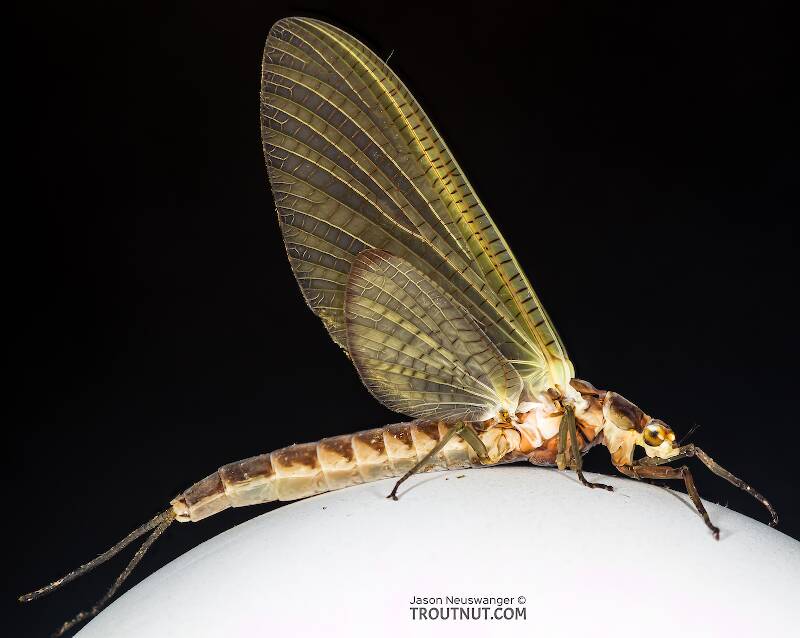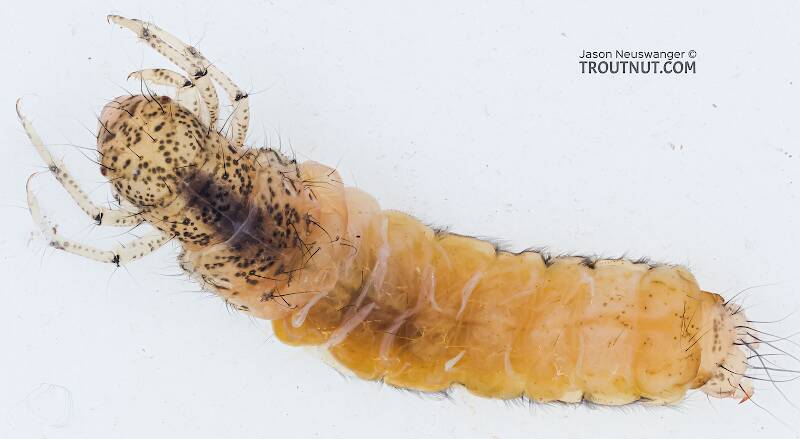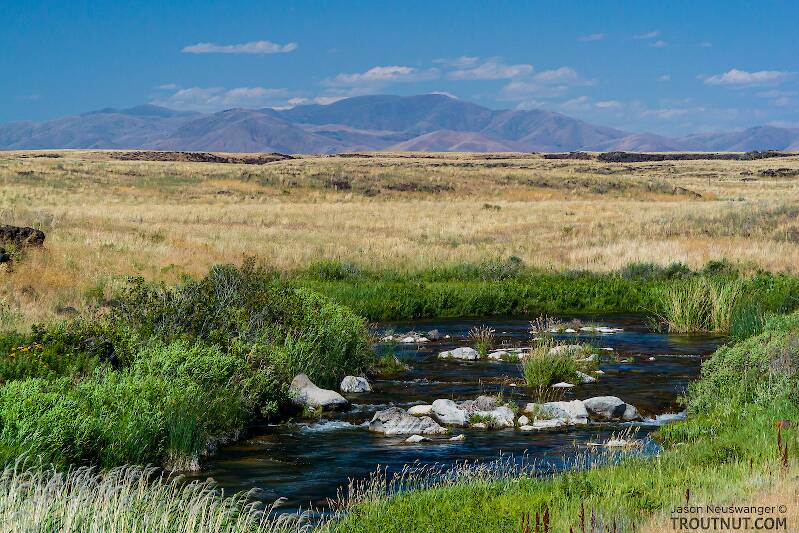
Hex Mayflies
Hexagenia limbata
The famous nocturnal Hex hatch of the Midwest (and a few other lucky locations) stirs to the surface mythically large brown trout that only touch streamers for the rest of the year.
Featured on the forum

This is a striking caddis larva with an interesting color pattern on the head. Here are some characteristics I was able to see under the microscope, but could not easily expose for a picture:
- The prosternal horn is present.
- The mandible is clearly toothed, not formed into a uniform scraper blade.
- The seems to be only 2 major setae on the ventral edge of the hind femur.
- Chloride epithelia seem to be absent from the dorsal side of any abdominal segments.
Based on these characteristics and the ones more easily visible from the pictures, this seems to be Grammotaulius. The key's description of the case is spot-on: "Case cylindrical, made of longitudinally arranged sedge or similar leaves," as is the description of the markings on the head, "Dorsum of head light brownish yellow with numerous discrete, small, dark spots." The spot pattern on the head is a very good match to figure 19.312 of Merritt R.W., Cummins, K.W., and Berg, M.B. (2019). The species ID is based on Grammotaulius betteni being the only species of this genus known in Washington state.
- The prosternal horn is present.
- The mandible is clearly toothed, not formed into a uniform scraper blade.
- The seems to be only 2 major setae on the ventral edge of the hind femur.
- Chloride epithelia seem to be absent from the dorsal side of any abdominal segments.
Based on these characteristics and the ones more easily visible from the pictures, this seems to be Grammotaulius. The key's description of the case is spot-on: "Case cylindrical, made of longitudinally arranged sedge or similar leaves," as is the description of the markings on the head, "Dorsum of head light brownish yellow with numerous discrete, small, dark spots." The spot pattern on the head is a very good match to figure 19.312 of Merritt R.W., Cummins, K.W., and Berg, M.B. (2019). The species ID is based on Grammotaulius betteni being the only species of this genus known in Washington state.

Troutnut is a project started in 2003 by salmonid ecologist Jason "Troutnut" Neuswanger to help anglers and
fly tyers unabashedly embrace the entomological side of the sport. Learn more about Troutnut or
support the project for an enhanced experience here.
HandiFly on Mar 9, 2013March 9th, 2013, 5:51 pm EST
The Tippicanoe River, “the river of lakes,” joins the Wabash somewhere on its 225 mile journey on the outskirts of Lafayette, Indiana, the place of my earliest memories. It was here that William Henry Harrison defeated Tecumseh on the south bank of the river. He had cheated the Miami Indians out of millions of acres of land and tried unsuccessfully to establish slavery on it. We are fortunate that the last person to be President born a British subject had so short a tenure. He died after a month in office from a common cold before he could do any real harm.
My battles were on a smaller scale and consisted of week-end excursions to fish this river. It was the mid 1950’s. While the greater world rang with Joseph McCarthy hearings, and black rock & roll groups leading white youth to perdition, I learned to cast a fly rod. My father, a professor at Purdue, had no patience to teach me.
Before disappearing downstream for a day’s fishing he would demonstrate, “back to 2 o’clock, forward to 11 o’clock, then lay it down,” and then he was gone. The wind was not my friend and behaved as if it had been bribed to send my line into a tree. The rocks were not behindhand in this game and grabbed every fly I managed to get into the water. You would think they had mouths full of razor sharp teeth, seizing each fly and grinding it up before my line slackened and was released.
The Tippicanoe is too warm to hold trout, but is otherwise as diverse a habitat as Darwin ever could have desired. Coarse fishing as the British styled it then and now, our prey was the smallmouth bass.
“Inch for inch and pound for pound, the gamest fish that swims,”
my father would often quote, thumping Doc Henshall’s 1889 Book of the Black Bass like a born-again-Christian and his bible.
My first rod was an 8 ft. club made of fiberglass by the Southbend Company. It was stiff and an ugly yellow color like bad cheese. My reel was a hand-me-down Medalist, large enough for salmon or steelhead which my father had bought 2nd hand on the hopes of future big game adventures.
With these accoutrements I tackled the job of fishing, and most days was found wanting. My father would return after a day wading the river and would ask,
“Any luck?”
Crestfallen, I would point to a Gordian tangle of my line and leader. It would be clipped and left on the bank (we did not know then about it fouling the nests of birds) and we would retreat to a fisherman’s bar for respite and a hamburger.
* * *
My battles were on a smaller scale and consisted of week-end excursions to fish this river. It was the mid 1950’s. While the greater world rang with Joseph McCarthy hearings, and black rock & roll groups leading white youth to perdition, I learned to cast a fly rod. My father, a professor at Purdue, had no patience to teach me.
Before disappearing downstream for a day’s fishing he would demonstrate, “back to 2 o’clock, forward to 11 o’clock, then lay it down,” and then he was gone. The wind was not my friend and behaved as if it had been bribed to send my line into a tree. The rocks were not behindhand in this game and grabbed every fly I managed to get into the water. You would think they had mouths full of razor sharp teeth, seizing each fly and grinding it up before my line slackened and was released.
The Tippicanoe is too warm to hold trout, but is otherwise as diverse a habitat as Darwin ever could have desired. Coarse fishing as the British styled it then and now, our prey was the smallmouth bass.
“Inch for inch and pound for pound, the gamest fish that swims,”
my father would often quote, thumping Doc Henshall’s 1889 Book of the Black Bass like a born-again-Christian and his bible.
My first rod was an 8 ft. club made of fiberglass by the Southbend Company. It was stiff and an ugly yellow color like bad cheese. My reel was a hand-me-down Medalist, large enough for salmon or steelhead which my father had bought 2nd hand on the hopes of future big game adventures.
With these accoutrements I tackled the job of fishing, and most days was found wanting. My father would return after a day wading the river and would ask,
“Any luck?”
Crestfallen, I would point to a Gordian tangle of my line and leader. It would be clipped and left on the bank (we did not know then about it fouling the nests of birds) and we would retreat to a fisherman’s bar for respite and a hamburger.
* * *
David Bershtein
www.handifly.com
"A fisherman riseth up early in the morning. Mighty are his preparations. he returns in the evening cursing and smelling of strong drink."
www.handifly.com
"A fisherman riseth up early in the morning. Mighty are his preparations. he returns in the evening cursing and smelling of strong drink."
Quick Reply
Related Discussions
Topic
Replies
Last Reply
1
Nov 18, 2007
by Martinlf
by Martinlf
2
Mar 10, 2008
by Joec
by Joec

